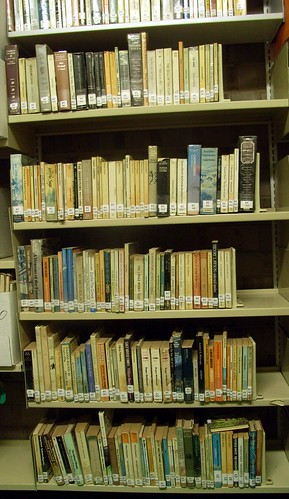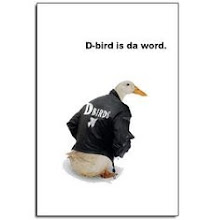
.
Isn't that in inspiring collection? Not?
.
So over the last couple of years, a few of these have been reclassified back into Fiction, and have gone back to the ordinary fiction shelves - Alice in Wonderland is one example, probably driven to some extent by interest in the upcoming Tim Burton film (Johnny Depp as the Mad Hatter...). I bought a new Pride and Prejudice, since the ones from here were all ratty. Ditto Wuthering Heights. Ditto Jane Eyre. Ditto a few others, redeemed for various reasons.
.
Nobody has come hunting for Dostoyevsky. Or Hesse. Or Xavier Herbert. (I can name you the only student I know who read Dostoyevsky, and she did her HSC five or six years ago). I don't quite know why some of these were acquired in the first place - unrefusable donations, perhaps?
.
So now the time has come, and the Fiction Classics are being reviewed. A half dozen or so have been selected for redemption, but most have been disposed of. They aren't being used. They aren't appealing editions (for some, the spines are unreadable).
.
To cull, though, is not necessarily to lose. For all the material here that is out of copyright (most of it), it won't be inaccessible to our students. There are plenty of e-book libraries online where these can be obtained, in a format readable on a computer - eg. web page, or pdf. E-reader not required. A whole class can access the one book, so it's more than the physical printed books we had here could do.
.
Certainly, the copyright material isn't so readily available; but if it's not being used now, and hasn't found friends for years, how strong is the library-as-depository argument anyway? We can't keep everything. Taking this material off the shelves has made room for, and showcased, a lot of other books which have been finding friends and encouraging our students to read and borrow. They may not be reading Xavier Herbert, but they are reading Scott Westerfeld. And finding books they want to borrow more easily, without these dreary-looking books.
.
Local libraries offer access to interlibrary loans, if copyright material is needed. Our role has changed, with the opportunities the internet offers, from what we thought we oughta or needed to do, twenty years ago. So these books are now culled, but to cull doesn't mean to lose. Now we have a responsibility to make our students aware of the other possibilities to support the collections we keep - like e-book libraries. More on them later.
.
Cheers, Ruth
.
*GIFSL = good ideas for school libraries
.






















2 comments:
Ruth: I feel your pain! Every day we are throwing books "out" and each time we say, "This is a great book, but..." Either it is too tatty for the shelves or it is out of vogue. It would be great if we could get them in kids' faces. I will post on this, too, at some stage! Regards, Shane
It's one thing to cull fiction (which I did last year, getting rid of over 1,000 yellow, unloved, no-loans-in-10-years shabby volumes. Non-fiction is a different challenge. I had each department in for afternoon tea (we supplied the food) to cull their subject areas. Most were hoarders! I had to convince some HSIE teachers to cull way out-of-date georgraphy titles because "they might be useful some time". I used to feel guilty about culling, but I have now come to understand that books, like people, have a lifespan. Once it's over, it's time to go.
Post a Comment